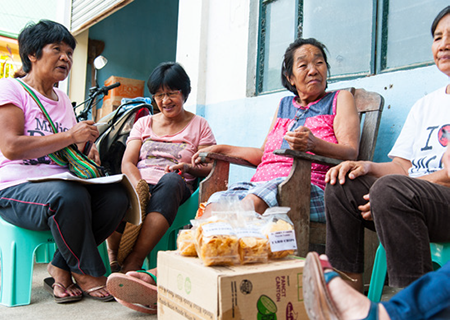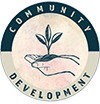ABM Archive Website
THIS WEBSITE CONTAINS ARCHIVE MATERIALS FOR HISTORICAL REFERENCE ONLY
For up-to-date information, including our latest appeals, news, and resources, please visit our current website.
Philippines:Economic Empowerment
 |
|
Dolores Bayucca, pictured left, leads a meeting with her colleagues to discuss details |
 |
This is part of the Community Development Program: Learn more about ABM’s Programs
If you were in Barangay Nayon in Lamut, Ifugao Province in the Philippines looking for a healthy snack, ABM would highly recommend the Taro chips made by Dolores Bayucca and her colleagues. At 53 years old, Dolores is the chair of the women’s group at St John’s Mission in Nayon. These women have come together to both design and implement this taro chip activity.
The idea began in 2013 with a visit from the staff of ABM’s local partner organisation, Episcopal CARE, who spoke about using ‘Asset-Based Community Development’ (ABCD) to generate ideas in raising income. The ABCD approach encourages communities to look at what resources and skills they already have and together think of what could be done to produce additional household income.
The women in Nayon did just that, and saw that there was plenty of the root vegetable, taro, growing around the place. Normally used as stock feed, this nutritious vegetable was clearly being under-utilised and the idea of transforming it into a desirable snack grew from there.
Using a small loan from Episcopal CARE, the women began to grow, harvest, process and package taro as chips. This snack proved popular and their loan was quickly repaid. Episcopal CARE even began purchasing the chips as food relief to the victims of Typhoon Haiyan as they were seen as a healthy alternative to many other pre-packaged goods being donated.
Since that time, the initiative has continued to expand. There are at least six women who work regularly and up to 12 women able to work on the processing and packaging of the chips at any one time. Dolores and her group have been provided with a grant from the Philippines’ Department of Science and Technology (DOST) which will allow them to process other foods. DOST is assisting the group with an automatic chipper, slicer and a commercial oven, which will increase production as well as decrease the intensive work of cutting and slicing taro.
When asked about the income that Dolores has received from the chips, she beams with pride.
“I have been able to buy soap for my family, as I have seven children. And when St John’s Mission in Nayon started to build a church, our group was able to contribute 10,000 pesos! I think this project has encouraged other women and families in our community to grow taro to eat, as it grows so well and is good for living.”
ABM’s South East Asia Programs Coordinator, Lina Magallanes, said she has seen a significant improvement in the group’s financial and business skills. They now displayed confidence in managing the income and expenses of the project, discussing the details of administration and an awareness of the importance of marketing strategies to expand their potential profits.
Your contribution to the Economic Empowerment project empowers people like Dolores to determine their own future and build tangible livelihoods. The program aims to build self-reliant and sustainable communities with increased family incomes using resources already available to the communities.
PH001EE needs $40,000 in 2017 (tax-deductible)
| This project receives partial funding from the Australian Government. |
HOW TO DONATE
You can make an online donation to this project. ![]()
Alternatively, for donations by cheque/money order (made out to the Anglican Board of Mission – Australia), telephone or email, view contact details here. Please don’t forget to include the project name and/or code with your payment details.
Gifts to ABM will be applied to the support of project(s) selected. In the unlikely event of the project being oversubscribed or not proceeding to completion, donations will be applied to a similar project to the one(s) selected.
PROJECT UPDATE
November 2017 – The Bauyan rice planters have experienced a remarkable transformation, thanks to the work of IFI VIMROD through the Economic Empowerment project. Read more.
April 2017 – Last month, ABM Pacific Programs Officer Kate Winney had the opportunity to travel to the Philippines with ABM Education Officer Sarah Gover, to learn about E-CARE’s approach to community development. Read more.
February 2017 – The Dagadag Farmers Association, as it is known today, was formed and organized when some of the struggling farmers learned about what the E-CARE Foundation was doing in a community nearby. Due to their earnest desire to improve their economic situation for their families and community, E-CARE agreed to begin a similar Asset-based Community Development project in Dagadag. Read more.
This video tells the story of the Kasalika Association in Manila, Philippines. Kasalika means ‘you belong’. It is the group that sews ABM bags for Synod packs in Australia.
The video was filmed and produced by Farida Pasiwen-Cawatig who is the Program Assistant on Research and Documentation for the Community Based Development Program of the Episcopal Church in the Philippines.
< Back


